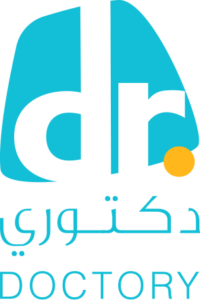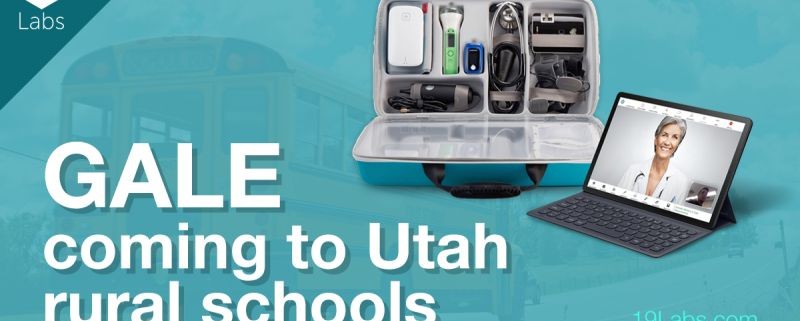We’re glad to support Utah Education Network and Utah Department of Health in this project to bring telehealth kits to rural schools. #GALE helps improve access to care to students in remote areas and also reduces the amount of time nurses spend traveling to visit each school. 19Labs is bringing the clinic to where the patients are. Eko Samsung Electronics Zoom
School Nurses welcome time-saving innovation

UETN is using about $1 million of CARES Act funding to provide 175 telehealth kits to Title I schools in rural Utah and schools who had a high need due to geography. The kits, provided by 19Labs, contain a tablet computer, digital stethoscope, digital camera, spirometer, blood pressure cuff, infrared thermometer and pulse oximeter. Each of the attachments connects to the tablet via Bluetooth to transmit to school nurses online. The price of the kit includes five years of maintenance and technical support.
“We are honestly ecstatic about this,” Tuttle said. “We have two school nurses to cover 12 schools in our district, and it will be amazing.”
School nurses are spread thin in Utah. According to a 2019 Utah Department of Health report Utah has one school nurse for every 3,595 students, which is five times higher than the ratio recommended by the Centers for Disease Control. School nurses play a vital role by providing health screenings, monitoring students who have chronic diseases, and training students and staff about health issues. In 2020, they added COVID-19 monitoring as well.
Tuttle said the nurses will still rely on someone at the school — administrators, secretaries or health aides — to help operate the devices. “We really heavily rely on our front-end staff, but to be able to just chime in at any given part of the day, at any school, will be absolutely amazing.”
In Emery County, the two school nurses are responsible for 3,075 students, but other districts have a much higher ratio of students to nurses. “I have a couple of parents that are not happy that there isn’t a school nurse in their school every day,” Tuttle said, “So I think this will not only alleviate the challenges with the students, and the parents as well.
“The goal of this project is to reduce the amount of time school nurses spend traveling to visit each school and improving access to care and the overall health of students in Utah,” said Matt McCullough, associate director of telehealth at UETN. “The kits will connect schools to school nurses who can’t be there on site all the time.”
The Utah Department of Health administrators are similarly enthusiastic. “We have been talking to a lot of different organizations about something similar, [but] nothing ever happened,” said Betty Sue Hinkson, school nurse coordinator at the Utah Department of Health. “So, I really didn’t expect anything to happen here either… I was really kind of surprised that this actually came to fruition.”
Ray Timothy, director and CEO of UETN said, “UETN is dedicated to the well- being of Utah’s students and is excited to participate in this project to help school nurses be more effective. This is CARES money well spent.”
Ram Fish, CEO of 19Labs, said the GALE platform was originally developed as a smart first aid kit after his one-year-old daughter suffered a medical emergency while his family was on vacation in rural Mexico. “The full name of the product is Nightingale, after Florence Nightingale, but in the lab we just refer to it as GALE.”
“We believe the new technology will make a huge impact and make the nurses’ jobs easier and more effective,” Fish said. “And, of course, bringing health care with a good quality to all of these schools especially those in rural locations.”
McCullough said UETN’s aim was to help schools in rural and low-income areas. “Our primary focus is getting them out to Title I schools in mostly rural school districts by the end of the year.”
“There are school based health centers and schools using telehealth all over the country, but this is pretty big,” McCullough said. “To put 175 units into 22 rural school districts is pretty major. We are one of the first to ever do it this large all at once, especially with CARES funding.”
McCullough said kits can also be used for mental health counseling visits and in crisis-intervention situations. To alleviate privacy concerns student data will be wiped off the devices after each visit.
“We want to use technology to help nurses connect to the schools they are responsible for,” McCullough said. “UETN has selected great technology, and we’re excited to learn what nurses do with it and the impact that the kit makes.”
For more information or interviews contact Matt McCullough.
FAQ:
How many kits are being purchased from 19Labs?
175 kits have been purchased.
How are the kits being funded?
UETN is using nearly $1 million from the Coronavirus Aid, Relief, and Economic Security (CARES) Act to purchase the kits and five years of service and support for each kit.
What is included in the kits?
The GALE telehealth platform includes a tablet computer, a digital stethoscope, digital camera, spirometer (for measuring lung capacity), blood pressure cuff, infrared thermometer and pulse oximeter. Unlimited Zoom video visits are also included with the kits.
How long will schools have paid technical support for the kits.
The contract with 19Labs includes five years of service and support for the kits.
Are there any legalities to using the kits in school?
There will be student information and health data collected, but the information will be deleted from the devices after each visit. The system will comply with HIPPA rules.
When will delivery take place?
Delivery is to be completed before the end of the year.
Source: UTAH




